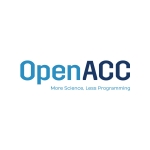Committed to driving ongoing value, the Organization announces an updated specification, a new incoming president and full schedule of GPU Hackathon events.
ST. PAUL, Minn.–(BUSINESS WIRE)–#GPU–OpenACC-Standard.org, a nonprofit organization dedicated to helping the research and developer community advance science by expanding their accelerated and parallel computing skills, has announced Jack Wells, director of strategic planning and performance management at Oak Ridge National Laboratory, as the incoming president. Additionally, the Organization announced updates to the specification OpenACC 3.1 and the 2021 schedule of global GPU hackathons and bootcamps.
Furthering the OpenACC Organization Mission
The OpenACC Organization has broadened its mission beyond its original charter in an effort to create a bridge to heterogeneous programming by not only developing the OpenACC specification, but also by focusing on participating in computing ecosystem development and providing hands-on training and education on state-of-the art programming models, resources and tools.
As incoming president, Jack Wells will continue to progress the Organization’s mission by leveraging both his expertise in computational science and experience managing leadership-class computing resources available to researchers from government, academia, and industry.
“As we ready future systems to support science in the exascale era, I am extremely excited about the science that will emerge. Data analytics and machine learning creatively integrated with modeling and simulation is growing, and it is clear that hybrid, accelerated computing technologies are a large part of this story,” said Wells. “Important to the story is the development of a performance-portable programming tool chain for scientific computing. This includes the evolution of language extensions and frameworks; maturation of accelerated compiler directives such as OpenACC; and the emergence and adoption of library abstractions, such as Kokkos and Raja. It also includes providing training and education for our researchers to avail themselves of these accelerated technologies. This is all within the scope of the OpenACC Organization’s mission.”
Wells succeeds Duncan Poole, who will continue to serve as Chairman on the OpenACC Board of Directors.
“Serving as President has been a wonderful and humbling experience. It is excellent to see how the Organization has matured with the participation from new board members and executive management,” said Poole. “We have accomplished so much towards developer advocacy, development and adoption of the specification, and our broader mission to support best practices in accelerated computing. Jack has an excellent grasp of the leadership challenges we face and has been an able spokesperson working in many areas of critical importance to our Organization.”
Introducing OpenACC 3.1
After last year’s major specification update, 3.0, the technical committee took some time to give OpenACC compilers a chance to catch up to the current specification before adding other major features. The development work for OpenACC 3.1 focused primarily on clean-up and clarifications for the specification with only a few new user-facing features, including support for Fortran BLOCK and DO CONCURRENT constructs, support for C++ range-based FOR loops, and improved compatibility between implementations by specifying argument names in API routines.
For more information about what’s new in OpenACC 3.1 and a discussion on additional topics that have been worked on this year but were not included in 3.1, please read the full specification updates here.
Continuing the Momentum: 2021 GPU Hackathons and Bootcamps
OpenACC Organization has spearheaded global hackathon events in collaboration with Oak Ridge National Laboratory and other leading organizations since 2014. Now in its sixth year, the GPU Hackathon program includes both full Hackathon events and short-format GPU Bootcamp events that cover high-performance computing (HPC), artificial intelligence (AI) and data science.
Even amidst the COVID-19 pandemic, the number of 2020 events has expanded exponentially. Introducing a new virtual format enabled 18 full GPU Hackathons and over 25 Bootcamp events to be held remotely across Europe, Asia, India and North America, resulting in over 2100 people trained and over 410 applications utilizing GPU-acceleration in part or completely. A full calendar of worldwide events for 2021, including 28 GPU hackathons and over 40 bootcamps, is planned.
Training materials for two GPU Bootcamps can be found and accessed on GitHub, including:
- OpenACC Bootcamp: With these bootcamp materials, users can learn how to: write a portable parallel program that can run on multicore CPUs and accelerators such as GPUs; apply incremental parallelization strategies using the OpenACC programming model to accelerate an example application that simulates heat distribution across a 2-dimensional metal plate; and apply this knowledge to accelerate a mini-application.
- AI for Science Bootcamp: With these bootcamp materials, users can learn how AI can accelerate HPC simulations like Computational Fluid Dynamics or Climate by introducing the concepts of Deep Neural Networks, including data pre-processing, and techniques on how to build, compare and improve accuracy of deep learning models. Materials will introduce real-world problems, where participants learn AI concepts with step-by-step instructions and apply the taught solution to accelerate simulations using data driven approaches.
Visit www.gpuhackathons.org for additional information about GPU Hackathons and Bootcamps.
About the OpenACC.org
The OpenACC Organization is dedicated to helping the research and developer community advance science by expanding their accelerated and parallel computing skills. We have three areas of focus: developing the OpenACC specification; providing training and education on programming models, resources and tools; and participating in the computing ecosystem development. Please visit www.openacc.org for more information.
Contacts
Izumi Barker
OpenACC PR Director
650-766-9542
izumi.barker@openacc.org






